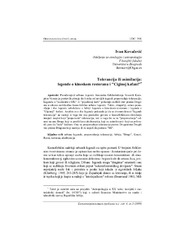Приказ основних података о документу
Tolerancija ili asimilacija - legende o kineskom restoranu i 'Ciginoj kafani'
Tolerance or assimilation: The legends of the Chinese restaurant and 'The Gypsy's Tavern'
| dc.creator | Kovačević, Ivan | |
| dc.date.accessioned | 2021-10-12T10:56:23Z | |
| dc.date.available | 2021-10-12T10:56:23Z | |
| dc.date.issued | 2009 | |
| dc.identifier.issn | 0353-1589 | |
| dc.identifier.uri | http://reff.f.bg.ac.rs/handle/123456789/859 | |
| dc.description.abstract | Proučavajući urbane legende francuska folkloristkinja Veronik Kampion Vensan je postavila pitanje da li neke od novijih legendi propovedaju toleranciju. Legende o 'incidentu u liftu' ili 'pojedenoj karti' pokazuju različit stav prema Drugi-ma u odnosu na klasične ksenofobične urbane legende. Takav drugačiji, odnos ponavljaju i dve legende zabeležene u Srbiji: legenda o kineskom restoranu i legenda o 'Ciginoj' kafani. Analiza ove dve legende pokazala je da se dvosmislenost 'legendi tolerancije' ne sastoji iz toga što one paralelno govore o ksenofobičnom okruženju imajući rasplet koji 'propoveda' toleranciju, već iz toga što se to 'propovedanje' od-nosi na one Druge koji su prošli kroz akulturaciju, koji su asimilovani i koji su prihvatili pravila 'naše' kulture. One ne propovedaju toleranciju prema Drugostima Drugih već prema Drugima koji nastoje ili su uspeli da postanu 'Mi'. | sr |
| dc.description.abstract | Studying urban legends, the French folklorist Veronique Campion-Vincent posed the question of whether some of the more recent legends preach tolerance. The 'elevator incident' or 'swallowed ticket' legends display a different attitude to Others from that found in classic xenophobic urban legends. This different attitude is also to be found in two legends recorded in Serbia namely, the legend of the Chinese restaurant and the legend of 'The Gypsy's Tavern'. An analysis of the two legends shows that the ambiguity of 'tolerance legends' does not arise from the fact that they speak about a xenophobic environment while at the same time having a denouement that 'preaches' tolerance, but rather from the fact that the 'preaching' relates to those Others who have gone through a process of acculturation, who have been assimilated and who have accepted the rules of 'our' culture. These legends do not preach tolerance towards the Otherness of Others but towards Others who are striving to become or have managed to become 'Us'. | en |
| dc.publisher | Univerzitet u Beogradu - Filozofski fakultet - Odeljenje za etnologiju i antropologiju, Beograd | |
| dc.relation | info:eu-repo/grantAgreement/MESTD/MPN2006-2010/147037/RS// | |
| dc.rights | openAccess | |
| dc.rights.uri | https://creativecommons.org/licenses/by/4.0/ | |
| dc.source | Etnoantropološki problemi | |
| dc.subject | urbane legende | sr |
| dc.subject | Srbija | sr |
| dc.subject | Romi | sr |
| dc.subject | restoran | sr |
| dc.subject | propovedanje tolerancije | sr |
| dc.subject | Kinezi | sr |
| dc.subject | 'Drugi' | sr |
| dc.subject | akulturacija | sr |
| dc.subject | urban legends | en |
| dc.subject | Serbia | en |
| dc.subject | Romanies | en |
| dc.subject | restaurant | en |
| dc.subject | preaching tolerance | en |
| dc.subject | 'Others' | en |
| dc.subject | Chinese | en |
| dc.subject | acculturation | en |
| dc.title | Tolerancija ili asimilacija - legende o kineskom restoranu i 'Ciginoj kafani' | sr |
| dc.title | Tolerance or assimilation: The legends of the Chinese restaurant and 'The Gypsy's Tavern' | en |
| dc.type | article | |
| dc.rights.license | BY | |
| dc.citation.epage | 80 | |
| dc.citation.issue | 3 | |
| dc.citation.other | 4(3): 67-80 | |
| dc.citation.rank | M24 | |
| dc.citation.spage | 67 | |
| dc.citation.volume | 4 | |
| dc.identifier.doi | 10.21301/eap.v4i3.4 | |
| dc.identifier.fulltext | http://reff.f.bg.ac.rs/bitstream/id/2384/856.pdf | |
| dc.type.version | publishedVersion |

